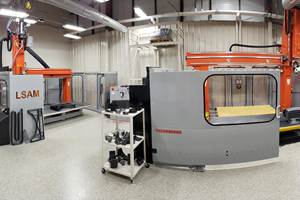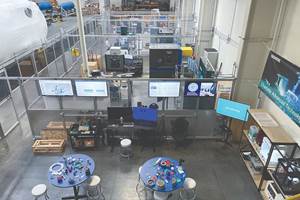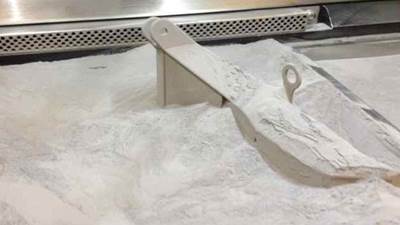Baker Hughes Successfully Implements Oqton Manufacturing OS System to Optimize Additive-Driven Manufacturing Workflow
3D Systems say this successful implementation demonstrates its Oqton Manufacturing OS’ ability to accelerate the design and production of additively manufactured parts across the entire manufacturing workflow to increase efficiency and facilitate regulatory compliance.
Oqton Manufacturing OS enables end-to-end additive-based workflow management and real-time monitoring to deliver a decentralized manufacturing solution. Source: 3D Systems Inc.
3D Systems says it has achieved a significant milestone in commercializing the Oqton Manufacturing OS as Baker Hughes successfully deploys the system as its production solution for additive-driven manufacturing workflow in Houston, Texas. The system is designed to enable on-demand additive manufacturing (AM) in regulated markets by providing full factory-floor workflow integration, thus transforming how products are brought to market.
Baker Hughes, an energy technology company, is now in full production with the Oqton Manufacturing OS in its central manufacturing facilities in Houston. This milestone is part of a commercial software agreement Baker Hughes entered with Oqton (a wholly-owned, independently operated subsidiary of 3D Systems) in March 2023, and reinforces the companies’ shared vision to support decentralized manufacturing.
The successful implementation of this solution by Baker Hughes demonstrates the Oqton Manufacturing OS’ ability to accelerate the design and production of additively manufactured parts across the entire manufacturing workflow to increase efficiency and facilitate regulatory compliance.
Baker Hughes began using Oqton Manufacturing OS and the Oqton operating system in June 2024 to scale the role of AM within its manufacturing workflow without compromising quality or the user experience. The system integration enables Baker Hughes to efficiently scale its production output while minimizing investments in the support structure.
Also, the end-to-end system facilitates the monitoring of key performance indicators through the production workflow. For build monitoring alone, Baker Hughes realized a 98% reduction in active monitoring engineering time, saving 136 engineering hours per printer annually. Root cause analysis has also decreased 98% through Oqton’s automated reporting. Additionally, Baker Hughes realized an 18% reduction in costs associated with scrap due to real-time actionable alerts during part production.
What Is Oqton Manufacturing OS?
Oqton Manufacturing OS was developed to help customers move from prototyping to a repeatable, high-quality production AM process, with full traceability from raw material through finished component, which is essential for high-reliability applications. Oqton Manufacturing OS manages, optimizes, automates, monitors and traces actions and data to increase throughput, scale production and maximize operational efficiency.
The system enables on-demand AM for regulated markets, improves efficiency and enables scalability leveraging power of real-time monitoring. It also provides full factory-floor workflow integration, automation, control and optimization from part design through inspection and certification. It facilitates, expedites order management process for end-to-end record control and traceability.
The solution is designed to address all key aspects of an end-to-end manufacturing workflow, including:
- Order management via a customer and supplier portal for order intake, capacity and demand planning, and quoting and approvals
- Engineering through 3DXpert enabling design for additive manufacturing (DfAM), build process preparation, simulation, AM inspection and digital rights management for functional efficiency
- Digital warehousing that provides user access segregation control with multifacility workflow management.
- An AM-based manufacturing execution system (MES) that enables operational excellence, management and traceability.
- Production monitoring based on internally developed IP using analytic-driven and deep learning capabilities to detect and alert anomalies in real time.
Real-World Impact for Regulated Industrial Environments
“We are pleased to achieve deployment of this solution with our strategic partner, Baker Hughes,” says Reji Puthenveetil, EVP, additive solutions and chief commercial officer, 3D Systems. “Oqton Manufacturing OS’ holistic approach to manufacturing, alongside Baker Hughes’ expertise in production for regulated industrial environments, has enabled us to demonstrate the real-world impact of this unique solution. Following this key demonstration of Manufacturing OS’ ability to drive efficiencies, increase automation and achieve savings in complex industrial environments, we are looking forward to its continued adoption.”
The Manufacturing OS production software improves efficiency through the automation of the complex process, from order requirements, design revision controls, qualified build setups, traceability and reporting. “It provides the tools to industrialize at scale the manufacturing without compromising the quality assurance of its production,” says Jim Apostolides, senior vice president, enterprise operational excellence, Baker Hughes.
According to Spherical Insights, the global manufacturing operations management software market was valued at $16.4 billion in 2022 and is expected to reach $52.7 billion by 2032.
3D Systems says the Oqton Manufacturing OS enables the next generation of manufacturing automation connecting existing applications and machines across facilities in multiple sites to enable collaboration. When combined with AM solutions, it reduces time to final high-quality, reliable and high-performance components designed to meet or exceed design criteria. The experts within Oqton, and more broadly 3D Systems, are said to have extensive experience helping customers in regulated industries meet these goals through tailored solutions. As a result, manufacturers can produce parts more efficiently while reducing costs.
Related Content
DOE Awards Nearly $3 Million to Develop Additive Manufacturing of Modular Wind Blades
The industry partners received the award to develop automation in additive manufacturing of tooling for large-scale wind blades that can accommodate continuous changes in blade geometry and scale.
Read MoreVideo: 5" Diameter Navy Artillery Rounds Made Through Robot Directed Energy Deposition (DED) Instead of Forging
Big Metal Additive conceives additive manufacturing production factory making hundreds of Navy projectile housings per day.
Read More3D Systems Helps TE Connectivity to Additively Manufacture Electrical Connectors
The foundation of the solution is a newly developed photopolymer 3D Systems engineered specifically to meet TE Connectivity’s requirements.
Read MoreAdvancing Additive Manufacturing With a CATCH and Release Approach
Solutions for energy efficiency, sustainability, part repair and more are developing at Siemens’ Charlotte Advanced Technology Collaboration Hub (CATCH) in North Carolina.
Read MoreRead Next
Profilometry-Based Indentation Plastometry (PIP) as an Alternative to Standard Tensile Testing
UK-based Plastometrex offers a benchtop testing device utilizing PIP to quickly and easily analyze the yield strength, tensile strength and uniform elongation of samples and even printed parts. The solution is particularly useful for additive manufacturing.
Read MorePostprocessing Steps and Costs for Metal 3D Printing
When your metal part is done 3D printing, you just pull it out of the machine and start using it, right? Not exactly.
Read MoreCrushable Lattices: The Lightweight Structures That Will Protect an Interplanetary Payload
NASA uses laser powder bed fusion plus chemical etching to create the lattice forms engineered to keep Mars rocks safe during a crash landing on Earth.
Read More





















